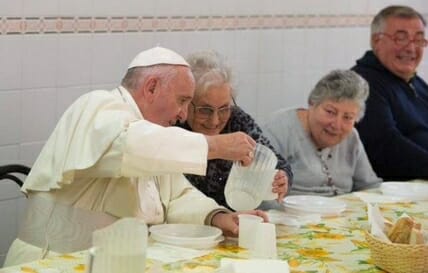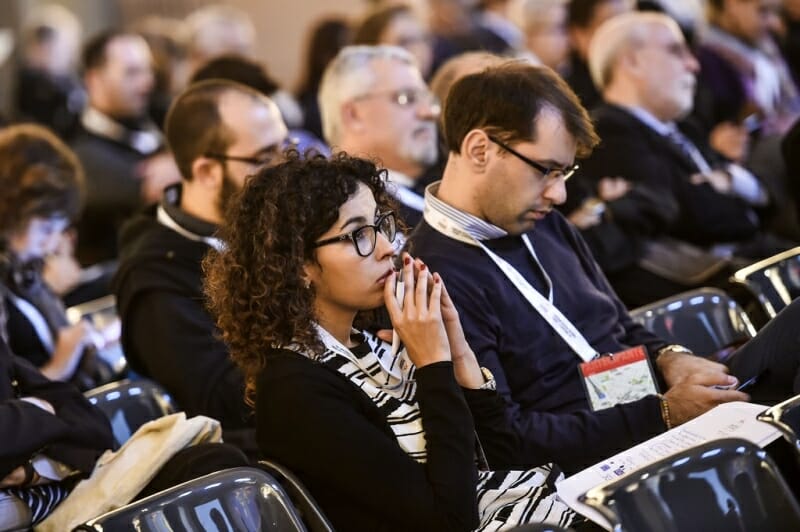![Paris: New Responsibilities for Peacebuilders]()
Nov 14, 2015 | Focolare Worldwide
“In the face of the dramatic events that took place in Paris last night, in addition to those in many other areas of the world, we stand in mourning with those who have lost loved ones and with those who believe that the unity of the human family is possible. As we stand in dismay and in the firm condemnation of such acts against human life, a question becomes very clear: have we taken every step and every action possible to build the necessary conditions for preventing violence and terrorist acts – including the encouragement of equality, of more solidarity, more communion of goods? In the face of events that appear perverse, it is obvious that there is no single answer. But it is also obvious that an uncontrolled reaction to violence will not deter those who want to destroy the life forces of peoples and their aspiration to coexist in peace.  The conviction that the world can walk towards unity, and overcome confrontation and armed violence, remains alive in the spirit and in the actions of those who have love for every person and the future of the human family at heart, and want to bring it about through political action, through the right use of economy, and the rule of law. The Focolare Movement, while it weeps with those who weep, continues to believe in the path of dialogue, of acceptance and of respect for the other, whoever that may be and from whatever background, religious belief, and ethnicity. Therefore, together with all those working for peace, in various posts of responsibility and often at risk to themselves, the Focolare renews its commitment to intensify and multiply acts and gestures of reconciliation, opportunities for dialogue and communion, for encounter and sharing at all levels and in all parts of the world, so as to embrace the cry of humanity and transform it into new hope.”
The conviction that the world can walk towards unity, and overcome confrontation and armed violence, remains alive in the spirit and in the actions of those who have love for every person and the future of the human family at heart, and want to bring it about through political action, through the right use of economy, and the rule of law. The Focolare Movement, while it weeps with those who weep, continues to believe in the path of dialogue, of acceptance and of respect for the other, whoever that may be and from whatever background, religious belief, and ethnicity. Therefore, together with all those working for peace, in various posts of responsibility and often at risk to themselves, the Focolare renews its commitment to intensify and multiply acts and gestures of reconciliation, opportunities for dialogue and communion, for encounter and sharing at all levels and in all parts of the world, so as to embrace the cry of humanity and transform it into new hope.”

Nov 14, 2015 | Focolare Worldwide

The Fifth National Ecclesial Convention in Florence, Italy, (November 9-13), Foto: Cristian Gennari/Siciliani

Pope Francis having lunch at the soup kithen. Photo: Ansa

Nov 14, 2015 | Non categorizzato
 That evening with friends I have some very close friends, most of them agnostics, with whom I had never explicitly spoken about my spiritual life. This had always left me with a certain sense of incompleteness. One evening we were taking a walk. Passing a church, I felt a strong desire to enter for a moment and greet Jesus. Being in the company of the others, this action seemed out of place, but I wanted to follow the impulse. During my brief visit in the church, I felt I had to say to Jesus: “Stay with me, because I am with you.” Shortly thereafter, at dinner, I felt I had to “reveal” myself to the others, but I didn’t know where to start! But then they spontaneously began to confront the topic of faith. It was a beautiful moment of communion. They expressed their perplexities to me, and words that even I hadn’t expected came out of my mouth. And all of this with mutual respect! Nothing of the kind could ever have happened if there hadn’t been that profound relationship between us. S. – Italy Sensitivity I am a nurse in the radiology department. In the corridors some patients wait their turn in their beds. One of them, with her arms bandaged, had been left uncovered. I greeted her, and with tact I covered her with the sheet. Years passed. One day, at a book presentation, a very elegant lady approached me: “I thank you for that day when you respected my dignity.” I almost didn’t recognize her. She continued: “It is when we suffer that we need even more to be respected as men and women. Thank you, because your service hasn’t made you insensitive.” E.M. – Hungary The embrace Seated at the desk of the charity center where I work, I was listening to a refugee whose appearance and clothing betrayed a past full of suffering. He was desperate because, having long been without work, he would be evicted from his lodging within a few days for not having paid the rent. I asked him, as I do with many like him, if he had friends here in the city who could help him. His reaction was unexpected: he burst into convulsive sobs, repeating: “I’m alone, alone! I have no one!” I was speechless, overwhelmed by a sense of powerlessness. Then, on impulse, I got up and went to embrace him. Slowly, he calmed down. He got up too, and with a tranquil tone of voice he said, “Now I know I am no longer alone,” and he made to leave, as if that simple brotherly gesture were enough to give him hope again. At that point I stopped him to show him how to procure himself clothing, make use of the Caritas dining hall and also a bed in our dormitory. By the time we separated, he was completely serene S. – Italy
That evening with friends I have some very close friends, most of them agnostics, with whom I had never explicitly spoken about my spiritual life. This had always left me with a certain sense of incompleteness. One evening we were taking a walk. Passing a church, I felt a strong desire to enter for a moment and greet Jesus. Being in the company of the others, this action seemed out of place, but I wanted to follow the impulse. During my brief visit in the church, I felt I had to say to Jesus: “Stay with me, because I am with you.” Shortly thereafter, at dinner, I felt I had to “reveal” myself to the others, but I didn’t know where to start! But then they spontaneously began to confront the topic of faith. It was a beautiful moment of communion. They expressed their perplexities to me, and words that even I hadn’t expected came out of my mouth. And all of this with mutual respect! Nothing of the kind could ever have happened if there hadn’t been that profound relationship between us. S. – Italy Sensitivity I am a nurse in the radiology department. In the corridors some patients wait their turn in their beds. One of them, with her arms bandaged, had been left uncovered. I greeted her, and with tact I covered her with the sheet. Years passed. One day, at a book presentation, a very elegant lady approached me: “I thank you for that day when you respected my dignity.” I almost didn’t recognize her. She continued: “It is when we suffer that we need even more to be respected as men and women. Thank you, because your service hasn’t made you insensitive.” E.M. – Hungary The embrace Seated at the desk of the charity center where I work, I was listening to a refugee whose appearance and clothing betrayed a past full of suffering. He was desperate because, having long been without work, he would be evicted from his lodging within a few days for not having paid the rent. I asked him, as I do with many like him, if he had friends here in the city who could help him. His reaction was unexpected: he burst into convulsive sobs, repeating: “I’m alone, alone! I have no one!” I was speechless, overwhelmed by a sense of powerlessness. Then, on impulse, I got up and went to embrace him. Slowly, he calmed down. He got up too, and with a tranquil tone of voice he said, “Now I know I am no longer alone,” and he made to leave, as if that simple brotherly gesture were enough to give him hope again. At that point I stopped him to show him how to procure himself clothing, make use of the Caritas dining hall and also a bed in our dormitory. By the time we separated, he was completely serene S. – Italy
 The conviction that the world can walk towards unity, and overcome confrontation and armed violence, remains alive in the spirit and in the actions of those who have love for every person and the future of the human family at heart, and want to bring it about through political action, through the right use of economy, and the rule of law. The Focolare Movement, while it weeps with those who weep, continues to believe in the path of dialogue, of acceptance and of respect for the other, whoever that may be and from whatever background, religious belief, and ethnicity. Therefore, together with all those working for peace, in various posts of responsibility and often at risk to themselves, the Focolare renews its commitment to intensify and multiply acts and gestures of reconciliation, opportunities for dialogue and communion, for encounter and sharing at all levels and in all parts of the world, so as to embrace the cry of humanity and transform it into new hope.”
The conviction that the world can walk towards unity, and overcome confrontation and armed violence, remains alive in the spirit and in the actions of those who have love for every person and the future of the human family at heart, and want to bring it about through political action, through the right use of economy, and the rule of law. The Focolare Movement, while it weeps with those who weep, continues to believe in the path of dialogue, of acceptance and of respect for the other, whoever that may be and from whatever background, religious belief, and ethnicity. Therefore, together with all those working for peace, in various posts of responsibility and often at risk to themselves, the Focolare renews its commitment to intensify and multiply acts and gestures of reconciliation, opportunities for dialogue and communion, for encounter and sharing at all levels and in all parts of the world, so as to embrace the cry of humanity and transform it into new hope.” 


